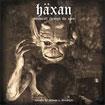 BURROUGHS, WILLIAM S. H�xan: Witchcraft Through The Ages CD (Sotpackan) 17.98
BURROUGHS, WILLIAM S. H�xan: Witchcraft Through The Ages CD (Sotpackan) 17.98��� Observant fans of Benjamin Christensen's classic 1922 quasi-documentary H�xan have probably noticed my own infatuation with this infamous silent film here at C-Blast, as certain images from the film have taken on an almost totem-like presence in some of the organization's visuals. It's easily one of my favorite films of all time, a groundbreaking piece of cinema that blew my eyeballs out of the back of my head the first time I watched it. Released in 1922, this silent horror film/mock documentary from visionary Danish director Benjamin Christensen traced the history of witchcraft and devil-worship from medieval times through to the early 20th century, but Christensen's free-wheeling blending of fact and fantasy ended up transforming the film into a sprawling surrealistic epic. With a mix of academic presentation, grotesque medieval imagery, and dramatized sequences, H�xan gets pretty bonkers; when many of these scenes unfold, it's as if you're seeing woodcuts from the Malleus Maleficarum or scenes from a Bruegel painting coming alive before your eyes. And it's still a provocative film even today, weaving together eroticism, surrealism, perversion and blasphemy to forge flickering cinematic images that continue to linger in my subconsciousness. While the original 1922 release remains the definitive version of H�xan, most contemporary audiences actually discovered the film through a 1968 re-release that replaced the title cards with a spoken-word narration track from none other than William S. Burroughs, backed by a wild experimental jazz score created exclusively for the film. The whole project was commissioned by British experimental filmmaker and cult film distributor Antony Balch, who had already worked with the likes of Burroughs and Kenneth Anger on short films, and his revised, shortened version of H�xan was retitled Witchcraft Through The Ages, eventually finding an audience among midnight movie enthusiasts in the decades that followed. Though the tone of the film mutates wildly from its original form when backed by this combination of Burroughs's spoken word and jazzy soundtrack, this version definitely conjures a strange, dreamlike vibe all its own.
��� Apparently never before released outside of the film, Sotpackan's H�xan features what appears to be the entire audio track from the abbreviated 1968 release of the film, nearly seventy-seven minutes of Burroughs reading from Christensen's original text, set over that eerie jazz backing track. And the music is great, and of particular interest to fans of European jazz: the group that Balch assembled for this project include renowned Swiss jazz drummer/composer Daniel Humair and virtuoso French jazz violinist Jean-Luc Ponty (Mahavishnu Orchestra, Return To Forever, Frank Zappa's The Mothers), who bring a mix of moody, creepy atmosphere and energetic playing to the recording. The sixteen tracks collected on this disc move chronologically, sometimes focused purely on Burroughs's reading of the text, often spiraling out into free jazz madness as the quartet weaves airy vibraphone and eerie violin over Humair's frenetic drumming and booming tribal rhythms, while smears of bleary gothic organ and ghostly Hammond shimmers in the darkness. Oboes chortle like conspiring witches, murmuring through stretches of abstract, clattery noisiness that can almost venture into AMM-esque territory, and there's one track where someone begins gibbering madly over one of these more melodious passages, and I couldn't help but be reminded of one of Magma's jazzier moments.
��� Like some infernal beat-jazz cathode-ray drenched dream seeping into your ears at 3 am in the morning, this recording is more delirious than diabolical, though the musicians do frequently slip into passages of sinister cacophony that evoke the scenes of devil worship, child sacrifice, and wanton debauchery that parade across the screen. It's capable of abruptly turning from strange and swinging into something nightmarish, and removed from the amazing imagery of the film, the audio transforms into something new, a murky midnight jazz album guided by Burroughs's gravelly, droning intonation, like something off of some ancient Caedmon LP. A fine addition to one's library of demonic soundtrack arcana.
Sample :

